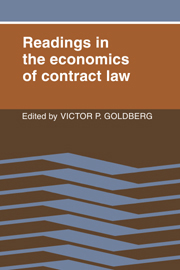Book contents
- Frontmatter
- Contents
- Preface
- Readings in the economics of contract law
- Part I Some preliminaries
- Part II Contract law and the least cost avoider
- Part III The expectation interest, the reliance interest, and consequential damages
- 3.1 The reliance interest in contract damages
- 3.2 Note on price information and enforcement of the expectation interest
- Questions and notes on protecting the property interest in the price
- 3.3 The contract–tort boundary and the economics of insurance
- 3.4 Notes on the reliance interest
- Questions and notes on fault, consequential damages, and reliance
- Part IV The lost-volume seller puzzle
- Part V Specific performance and the cost of completion
- Part VI Power, governance, and the penalty clause puzzle
- Part VII Standard forms and warranties
- Part VIII Duress, preexisting duty, and good faith modification
- Part IX Impossibility, related doctrines, and price adjustment
- Questions and notes on impossibility and price adjustment
- References
- Index of cases
- Author index
- Subject index
3.4 - Notes on the reliance interest
Published online by Cambridge University Press: 10 November 2010
- Frontmatter
- Contents
- Preface
- Readings in the economics of contract law
- Part I Some preliminaries
- Part II Contract law and the least cost avoider
- Part III The expectation interest, the reliance interest, and consequential damages
- 3.1 The reliance interest in contract damages
- 3.2 Note on price information and enforcement of the expectation interest
- Questions and notes on protecting the property interest in the price
- 3.3 The contract–tort boundary and the economics of insurance
- 3.4 Notes on the reliance interest
- Questions and notes on fault, consequential damages, and reliance
- Part IV The lost-volume seller puzzle
- Part V Specific performance and the cost of completion
- Part VI Power, governance, and the penalty clause puzzle
- Part VII Standard forms and warranties
- Part VIII Duress, preexisting duty, and good faith modification
- Part IX Impossibility, related doctrines, and price adjustment
- Questions and notes on impossibility and price adjustment
- References
- Index of cases
- Author index
- Subject index
Summary
We will try to get some mileage out of Security Stove & Manufacturing Co. v. American Railway Express Co., hardly the latest thing. The defendant broke its promise to deliver the plaintiff's gas furnace to Atlantic City to be exhibited at the American Gas Association Convention. The plaintiff intended to display, not sell, the particular furnace token it shipped. Profit would have come by increased sales and was uncertain. If exhibited, the furnace might have malfunctioned so the plaintiff would have sold fewer furnaces than it actually did. Or the plaintiff might have sold every furnace it could manufacture anyway.
With respect to the broken promise, the plaintiff sought reliance damages. … The defendant argued the plaintiff should get expectation damages or nothing (besides shipping charges refunded). The defendant complained the plaintiff was “endeavoring to achieve a return of the status quo in a suit based on a breach of contract,” thereby committing a conceptual error that the defendant invited the court not to endorse. The defendant said the plaintiff was “trying to recover what he would have had, had there never been any contract of shipment,” rather than correctly “seeking to recover what he would have had, had the contract not been broken.” Apparently, the defendant put squarely before the court the choice between protecting the expectation interest and protecting the reliance interest.
The court awarded reliance damages. The plaintiff had rented a booth at the convention. It had transported a workman and its president to Atlantic City and back and had maintained them there throughout the convention, waiting respectively to assemble the furnace and to point to it.
- Type
- Chapter
- Information
- Readings in the Economics of Contract Law , pp. 92 - 98Publisher: Cambridge University PressPrint publication year: 1982



